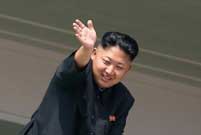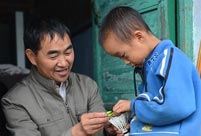BEIJING, Sept. 13 -- Chinese President Xi Jinping's maiden trip to four Central Asian countries and his participation at a summit of the Shanghai Cooperation Organization (SCO) strengthened bilateral relations and regional cooperation, Chinese Foreign Minister Wang Yi said on Friday.
Wang made the remarks after Xi concluded state visits to Turkmenistan, Kazakhstan, Uzbekistan and Kyrgyzstan earlier in the day, during which the Chinese president also attended an SCO summit in the Kyrgyz capital of Bishkek.
Central Asia has become a strategic partner of China in economic, trade and energy cooperation, said Wang, who accompanied Xi during the visits.
"Countries in the region not only face the opportunity to achieve common development by taking advantage of their economic complementarity, but also face the common threat of external intervention and the three evil forces," Wang said. "They all want to strengthen cooperation on bilateral level and within the framework of the SCO in order to build a peaceful, stable and safe neighboring environment."
During the visits, Xi held candid talks with his counterparts of the Central Asian countries on bilateral relations as well as regional and international issues of common concern.
The visits helped build personal ties and mutual trust between the leaders and lifted bilateral relations to a higher level, Wang said.
As important achievements of Xi's visits, China forged a strategic partnership with Turkmenistan and Kyrgyzstan respectively, and deepened the already-established strategic partnership with Kazakhstan and Uzbekistan.
Xi expounded China's foreign policy toward Central Asia, stressing China's respect for the countries' choice of development path, and urging China and the countries to firmly support each other on major issues concerning their such core interests as sovereignty, territorial integrity, security and stability.
Xi also stressed that China will never interfere in the internal affairs of Central Asian countries, never seek dominance nor build sphere of influence in the region, according to the foreign minister.
Xi's remarks were well received by the four Central Asian countries which referred to China as a reliable friend and partner.
The countries spoke highly of China's choice of development path. Among the leaders, Kazakh President Nursultan Nazarbayev told Xi that when China fares well, Kazakhstan will fare well.
During the visits, China and the Central Asian countries reached a consensus on the strategy to build a Silk Road economic belt, a platform for closer regional cooperation.
The Silk Road economic belt is a common aspiration of the countries in the region, which is set to unleash huge potential for development, bring regional countries closer and deepen their cooperation for the benefits of nearly three billion people, Wang said.
The leaders agreed to establish a stable and long-term relationship in energy cooperation, expand cooperation in non-resource areas, raise trade volume and improve interconnectivity, with a series of big-scale projects sealed during Xi's visits.
Wang said a total of 38 agreements were reached between the governments and companies, covering a wide range of areas and involving a large sum of investment.
In Tashkent, the Uzbek government decided to increase supply of natural gas to China, while in Astana, an agreement was reached to speed up the expansion of the first phase of China-Kazakhstan natural gas pipeline and the construction of the second phase.
In addition to the economic cooperation, the leaders also agreed to follow the spirit of ancient Silk Road and enhance exchange and mutual learning between different civilizations.
At the last stop of Kyrgyzstan, Xi also attended the 13th summit of the SCO, which boosted the healthy and pragmatic development of the group, Wang said.
Xi put forward a proposal on boosting comprehensive cooperation within the SCO, calling on members to carry forward the "Shanghai Spirit," which features mutual trust, mutual benefits, equality, consultation, respect for cultural diversity and pursuit of common development.
The Chinese president also urged SCO members to firmly support each other on major issues concerning their core interests, jointly safeguard regional security and stability, boost pragmatic cooperation and strengthen cultural and people-to-people exchanges.
During the summit, the SCO members agreed to beef up dialogue and coordination, consolidate their neighborliness and friendship, strengthen cooperation in security and join efforts to combat the "three evil forces" of terrorism, separatism and extremism.
SCO leaders issued the Bishkek Declaration, clarifying the bloc's stand on such key issues as Syria and terrorism, and approved a framework to implement the Treaty on Long-Term Good-Neighborliness, Friendship and Cooperation.
The achievements consolidated the foundation for SCO members to deepen pragmatic cooperation, Wang said.
 DPRK holds military parade to mark 65th founding anniv.
DPRK holds military parade to mark 65th founding anniv. Highlights of MAKS 2013 Int'l Aviation and Space Show
Highlights of MAKS 2013 Int'l Aviation and Space Show  10th China-ASEAN Expo opens in Nanning
10th China-ASEAN Expo opens in Nanning Photo story: A primary school of only two people
Photo story: A primary school of only two people An elderly Chinese street cleaner's love story
An elderly Chinese street cleaner's love story 'College campus queens' welcome the new students
'College campus queens' welcome the new students  'Travel everywhere in Beijing': China Railway Museum
'Travel everywhere in Beijing': China Railway Museum Chinese sports stars' school photos
Chinese sports stars' school photos  Players shining at the 12th National Games of China
Players shining at the 12th National Games of China Residences of the royal house of Savoy
Residences of the royal house of Savoy China's frigate 'Bengbu'in fire training
China's frigate 'Bengbu'in fire training The last days of Wan Aihua
The last days of Wan Aihua Highlights at 12th National Games of China
Highlights at 12th National Games of China Beijing Film Academy welcomes freshmen
Beijing Film Academy welcomes freshmen 2013 Taiwan Int'l Tourism Expo kicks off in Taipei
2013 Taiwan Int'l Tourism Expo kicks off in TaipeiDay|Week|Month